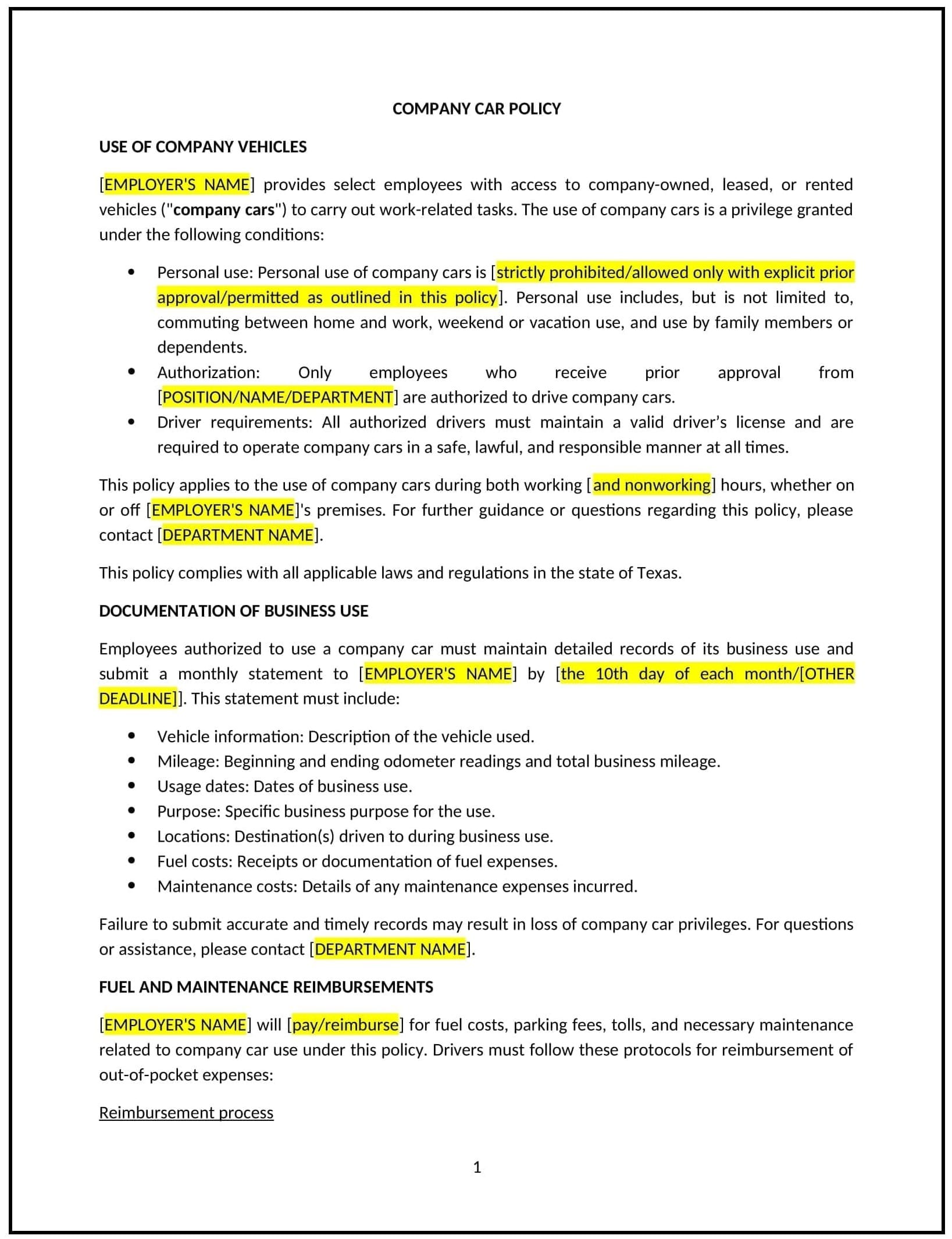Got contracts to review? While you're here for policies, let Cobrief make contract review effortless—start your free review now.

Customize this template for free
Company car policy (Texas)
This company car policy is designed to help Texas businesses establish clear guidelines for employees who are provided with a company vehicle for work-related purposes. Whether businesses are offering vehicles for commuting, business travel, or client visits, this template provides a structured approach to managing the use of company cars while improving compliance with company rules and state regulations.
By adopting this template, businesses can ensure responsible use of company vehicles, reduce liability risks, and provide clear expectations for employees regarding vehicle use and maintenance.
How to use this company car policy (Texas)
- Define eligible employees: Clearly specify which employees are eligible to receive a company car, such as those in sales, senior management, or employees whose job requires significant travel or client visits.
- Set acceptable use guidelines: Outline the acceptable uses for the company car, including commuting to and from work, travel for business meetings, or running work-related errands, while prohibiting personal use or unauthorized passengers.
- Specify maintenance and upkeep responsibilities: Explain the employee’s responsibility for maintaining the company car, including regular servicing, fuel management, and keeping the vehicle clean. The policy should clarify who is responsible for routine maintenance and how to handle vehicle repairs.
- Address insurance coverage: Provide details about the insurance coverage on the company car, including the type of coverage (e.g., liability, collision, and comprehensive) and the employee’s responsibility in case of an accident.
- Set guidelines for reporting accidents: Clearly define the process for reporting accidents or damage to the vehicle, including required documentation, insurance claims, and timelines for reporting incidents.
Benefits of using this company car policy (Texas)
This policy offers several benefits for Texas businesses:
- Reduces liability risks: By setting clear expectations for vehicle use, maintenance, and insurance, businesses can reduce the risk of liability for accidents or misuse of company cars.
- Ensures efficient vehicle management: Clear guidelines for maintenance and usage ensure that company cars are well-maintained and available for work purposes when needed.
- Promotes fair use: A structured policy ensures all eligible employees are aware of the rules regarding company car usage, preventing misuse and ensuring fairness across the workforce.
- Supports business operations: Providing company cars to employees who need them for business travel helps improve operational efficiency and employee productivity.
- Enhances employee satisfaction: Offering a company car as part of the benefits package can increase employee satisfaction and retention, especially for roles that require significant travel.
Tips for using this company car policy (Texas)
- Communicate the policy clearly: Ensure all employees who receive a company car understand their responsibilities regarding use, maintenance, and reporting of accidents.
- Implement regular vehicle inspections: Schedule regular checks and maintenance for all company cars to ensure they are in safe and operational condition.
- Monitor vehicle use: Track company car usage to ensure that vehicles are being used for business purposes only, and address any misuse promptly.
- Provide clear accident protocols: Ensure employees understand how to handle accidents or damage to company vehicles, including reporting steps, insurance claims, and liability.
- Review regularly: Update the policy periodically to reflect changes in Texas state laws, business needs, or the company’s vehicle fleet management practices.